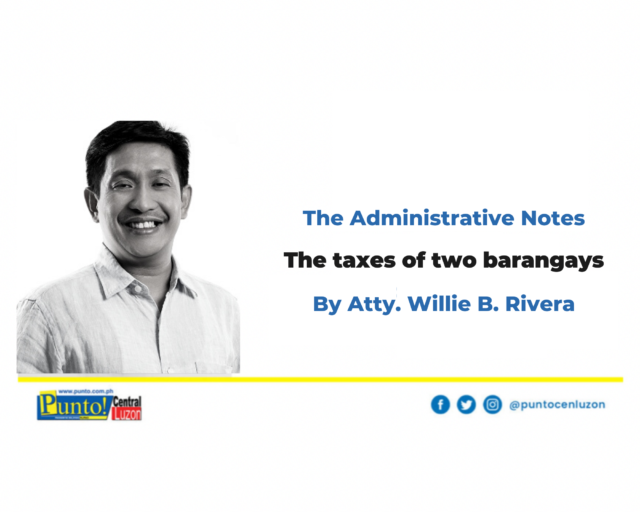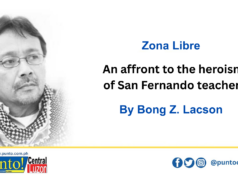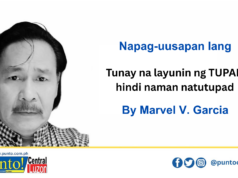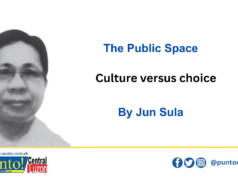TWO OF the 33 barangays in the City of Angeles have enacted their respective ordinances imposing business taxes within their respective jurisdiction. Is this allowable, considering that the city is already collecting the same business taxes?
The rule governing the taxing power of provinces, cities, municipalities and barangays is summarized by the Honorable Supreme Court in the case of ICard v. City Council of Baguio, that;
x x x x
Per Section 5, Article X of the 1987 Constitution, “the power to tax is no longer vested exclusively on Congress; local legislative bodies are now given direct authority to levy taxes, fees and other charges.” Nevertheless, such authority is “subject to such guidelines and limitations as the Congress may provide.”
In conformity with Section 3, Article X of the 1987 Constitution, Congress enacted Republic Act No. 7160, otherwise known as the Local Government Code of 1991. Book II of the LGC governs local taxation and fiscal matters.86
Indeed, LGUs have no inherent power to tax except to the extent that such power might be delegated to them either by the basic law or by the statute. “Under the now prevailing Constitution , where there is neither a grant nor a prohibition by statute , the tax power must be deemed to exist although Congress may provide statutory limitations and guidelines. The basic rationale for the current rule is to safeguard the viability and self-sufficiency of local government units by directly granting them general and broad tax powers. Nevertheless, the fundamental law did not intend the delegation to be absolute and unconditional; the constitutional objective obviously is to ensure that, while the local government units are being strengthened and made more autonomous , the legislature must still see to it that (a) the taxpayer will not be over-burdened or saddled with multiple and unreasonable impositions; (b) each local government unit will have its fair share of available resources; (c) the resources of the national government will not be unduly disturbed; and (d) local taxation will be fair, uniform, and just.”
Subject to the provisions of the LGC and consistent with the basic policy of local autonomy, every LGU is now empowered and authorized to create its own sources of revenue and to levy taxes, fees, and charges which shall accrue exclusively to the local government unit as well as to apply its resources and assets for productive, developmental, or welfare purposes, in the exercise or furtherance of their governmental or proprietary powers and functions.89 The relevant provisions of the LGC which establish the parameters of the taxing power of the LGUs are as follows:
SECTION 130. Fundamental Principles. – The following fundamental principles shall govern th e exercise of the taxing and other revenue-raising powers of local government units:
(a) Taxation shall be uniform in each local government unit;
(b) Taxes, fees, charges and other impositions shall:
- be equitable and based as far as practicable on the taxpayer’s ability to pay;
- be levied and collected only for public purposes;
- not be unjust, excessive, oppressive, or confiscatory;
- not be contrary to law, public policy, national economic policy, or in restraint of trade;
(c) The collection of local taxes, fees, charges and other impositions shall in no case be left to any private person;
(d) The revenue collected pursuant to the provisions of this
Code shall inure solely to the benefit of, and be subject to the disposition by, the local government unit levying the tax, fee, charge or other imposition unless otherwise specifically provided herein; and,
(e) Each local government unit shall, as far as practicable, evolve a progressive system of taxation.
x x x
SECTION 151. Scope of Taxing Powers. – Except as otherwise provided in this Code, the city, may levy the taxes, fees, and charges which the province or municipality may impose: Provided, however, That the taxes, fees and charges levied and collected by highly urbanized and independent component cities shall accrue to them and distributed in accordance with the provisions of this Code.
The rates of taxes that the city may levy may exceed the maximum rates allowed for the province or municipality by not more than fifty percent (50%) except the rates of professional and amusement taxes.
SECTION 186. Power to Levy Other Taxes, Fees or Charges. – Local government units may exercise the power to levy taxes, fees or charges on any base or subject not otherwise specifically enumerated herein or taxed under the provisions of the National Internal Revenue Code, as amended, or other applicable laws: Provided, That the taxes, fees, or charges shall not be unjust, excessive, oppressive, confiscatory or contrary to declared national policy: Provided, further, That the ordinance levying such taxes, fees or charges shall not be enacted without any prior public hearing conducted for the purpose.”
On the other hand, the taxing powers of the barangays are stated in Section 152 of the Local Government Code, that;
Section 152. Scope of Taxing Powers. – The barangays may levy taxes, fees, and charges, as provided in this Article, which shall exclusively accrue to them:
(a) Taxes – On stores or retailers with fixed business establishments with gross sales of receipts of the preceding calendar year of Fifty thousand pesos (P50,000.00) or less, in the case of cities and Thirty thousand pesos (P30,000.00) or less, in the case of municipalities, at a rate not exceeding one percent (1%) on such gross sales or receipts.
While the barangays are vested with authorities to impose taxes, the law is clear on its restriction that barangays can only impose taxes on establishments with gross sales of fifty thousand pesos (Php 50,000.00) or less. For business establishments with sales of more than fifty thousand pesos (Php 50,000.00), the barangay can only collect reasonable fees for the barangay clearance.
However, in the case of these two barangays, we have been receiving reports that fees for barangay clearances are exorbitant, rather than reasonable, which is violative of the law. Comparatively, other barangays do not charge as much. Why then do these two barangays blatantly collect fees more than what the law prescribes? Short of saying, these two barangays abuse their authorities.
Ergo, the taxpayer is doubly taxed – (1) the taxes should be paid once; (2) the taxs are of the same character and for the same purpose; (3) the taxes were imposed by the same taxing authority, within the same jurisdiction or taxing district; and (4) during the same taxing period. How then was double taxation by the barangay and the city became possible?
Simple. The two barangays passed their respective barangay Ordinances which were then submitted for approval to the Sangguniang Panlungsod. For unknown reasons, the Ordinances were approved despite the glaring fact that the Ordinances were violative of the Local Government Code. What baffles me is the fact that a certain City Councilor overlooked this restriction and turned a blind eye on these Ordinances.
To put an end to such malpractice of the barangays, the Duterte administration passed into law Republic Act 11032 or the Ease of Doing Business and Efficient Government Service Delivery Act of 2018, which amended Republic Act 9485 or the Anti-Red Tape Act of 2007.
Under the said law, “(B)arangay clearances and permits related to doing business shall be applied, issued, and collected at the city/municipality in accordance with the prescribed processing time of this Act: Provided, That the share in the collections shall be remitted to the respective barangays.” Hence, the local government units
integrated the issuance of barangay clearance and collection of the same into its system, allowing a more efficient and fast processing of business permits. The collections of the barangay clearances are then remitted accordingly to the respective barangays. In this manner, graft and corruption is likely to transpire in the barangay level. The enactment of Republic Act No. 11032 is perhaps one of the landmark laws in the Duterte administration, worthy of admiration as it curb graft and corruption among barangay officials.
As the good former DILG Secretary, Jesse Robredo, once said, “Unless and until the citizens claim good governance from those who vow to serve them, we will not succeed in the work of participatory governance.”





